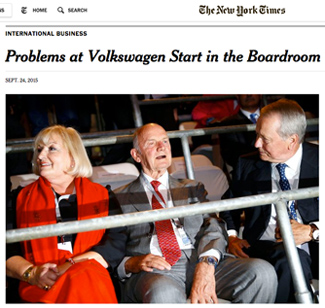|
|
As the VW scandal comes into clearer focus, we see a company that prioritized financial considerations over customers. The New York Times recently shared the insights of a former VW executive who said the scandal was “all but inevitable” because the company “will look the other way about anything” in deference to its “national mission to provide employment to the German people.” This preoccupation apparently led VW executives and engineers to knowingly install defeat devices meant to skirt regulatory emissions standards.
Why is this a “there but for the grace of God go I” moment for the rest of the industry? It’s because nearly every automaker in the world has to varying degrees made similar missteps as VW and car companies can no longer take customers for granted.
The next time an automaker lets its devotion to reputation delay a potentially life-saving recall, the regulatory environment will be far less forgiving. The next time a Detroit automaker can be painted as putting profits ahead of safety, the marketplace may prove far more resistant to forgive them. The price paid for putting customers second is rising, and as a result carmakers need to change their mindset.
 By necessity, Volkswagen will go first, and its actions to reaffirm its consumer commitment will have as significant an impact on its prospects as any other factor moving forward.
By necessity, Volkswagen will go first, and its actions to reaffirm its consumer commitment will have as significant an impact on its prospects as any other factor moving forward.
Job One is for the company to address consumers’ immediate concerns and communicate clearly how VW intends to address the foundational flaws in its software with minimal impact to consumers. This should be followed by concise actions to make consumers financially and environmentally whole again.
An antiquated option would be to simply offer a cash back refund or gas credit based on the total miles driven by the individual consumer.
A more creative option would be to offer affected consumers a retail-rate buy-back program that includes a deep discount on their new line of hybrids and electric cars.
This would not only address both the financial and environmental concerns of the affected consumers, but would also create an opportunity to highlight another line of vehicles that could help offset the fines and lawsuits that will eventually come.
Empirical evidence shows that if Volkswagen can accomplish these two immediate objectives, it may be able to mitigate a great deal of potential risk to its reputation and bottom line.
Indeed, the cultural changes VW makes to ensure customers come first are also what VW dealers, shareholders, suppliers and other stakeholders will be watching as they determine the future of their business with the company.
More important, those changes and how they are communicated—or lack thereof—will ultimately decide how VW is viewed by consumers who often remember the response to a crisis far longer than the crisis itself.
* * *
Patrick Hillmann is a VP at LEVICK. He can be reached at [email protected].



 There’s a fine line between newsjacking and taking advantage, aka ambulance chasing. Our job as PR professionals is to tread it carefully.
There’s a fine line between newsjacking and taking advantage, aka ambulance chasing. Our job as PR professionals is to tread it carefully. PR firms need to be mindful of ways their work product may be protected by the attorney-client privilege whenever working with a client’s internal legal team or its external legal counsel.
PR firms need to be mindful of ways their work product may be protected by the attorney-client privilege whenever working with a client’s internal legal team or its external legal counsel. Manuel Rocha, former US ambassador and intenational business advisor to LLYC, plans to plead guilty to charges that he was a secret agent for Cuba.
Manuel Rocha, former US ambassador and intenational business advisor to LLYC, plans to plead guilty to charges that he was a secret agent for Cuba. CEO mentoring is an often-overlooked aspect of why CEOs are able to make good decisions, and sometimes make bad ones—all of which intersects with the role and duties of a board.
CEO mentoring is an often-overlooked aspect of why CEOs are able to make good decisions, and sometimes make bad ones—all of which intersects with the role and duties of a board.  How organizations can anticipate, prepare and respond to crises in an increasingly complex world where a convergent landscape of global challenges, threats and risks seem to arrive at an unrelenting pace.
How organizations can anticipate, prepare and respond to crises in an increasingly complex world where a convergent landscape of global challenges, threats and risks seem to arrive at an unrelenting pace.


 Have a comment? Send it to
Have a comment? Send it to 
No comments have been submitted for this story yet.